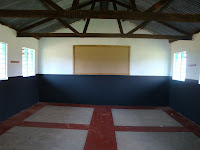Flaming Man
Walking to the borehole with both gerrycans tucked under my arms, I felt accomplished with the progress of my two primary projects. The classrooms complete and the kindergarten utilizing them for the first day. The schemes translated with a simple edit before publication. If all worked out, I would finish my projects in time for my visit home, able to relax and enjoy the month holiday. Passing the usual scene of children throwing rocks on school roofs, girls washing under the mango tree and cows grazing the compound, I let out a deep exhale and smiled. Then, I saw it. The doors to the classrooms looked ajar. I dropped my gerrycans and bolted for the building, dodging the cows, jumping over the newly laundered clothes and weaving through the rock throwers to get to the entrance of the kinder classrooms.
Inside was my worst nightmare: children urinating and defecating everywhere. To increase the severity of the situation, children smeared their excretions onto the wall. Upon my arrival, silence fell in the room. I saw a boy’s eyes dart towards the door and everyone ran for their lives. Exiting the classrooms, locking them once empty, those at the borehole stared, my face tormented between breaking down and losing it. I went home and induced a Benadryl coma. It’s the Peace Corps way.
The story continues over the course of three days and involves many excuses and a request for compensation for cooperation in editing the translated schemes. However, nothing can explain the lack of responsibility, consideration and professionalism shown by the kindergarten teachers. Everyone assured me nothing like this would happen again. I responded with, “Damn right it won’t because I’m not opening myself to be taken advantage of. It’s time for you to help yourself. I’ll find work elsewhere.”
After the showdown, I didn’t leave my house. I called Peace Corps to discuss the matter, as my counterpart and supervisor have never been “in the picture” and my program director assured a call back. (Still waiting five weeks later.) I felt completely defeated. I have never wanted to come home so badly in my life. I hid in my house I was so angry. My friends came to visit, telling me to take a “mental holiday.” I convinced myself I could work through this. After all, I hadn’t taken a night away in six weeks! I could do this! And then my head teacher visited to ask for monetary assistance for his recently announced Minister of Parliament campaign. My response? “Get the fuck out of my face.” I had a choice: get away or lose it.


Lake Bunyoni
Coming Out
The next day I got my defeated ass on the bus bound for Kampala and proceeded to the Southwest. Hills, rain, cold weather. Friends. Understanding. It was the rehab I desperately needed. Peace Corps is a strange beast. It brings experiences that push you to the brink; sometimes beyond. However, it brings people together in ways that are incredibly human. So, while it breaks your spirit, it gives you the means of healing, as well. There isn’t much to write about because its fabulousness came from being completely uncomplicated. I’d lay outside and read all day until Kelly would yell through the window, “Curry for dinner?” And I’d shake my head to accept the invitation.
This much I will write: I saw the reflection of my Peace Corps experience in Paul Theroux’s travel memoir Dark Star Safari. If you ever wanted to understand how in the hell Peace Corps changes people’s views on aid in Africa into something more conservative than when we arrived, READ THIS BOOK!
I Took a Fairy to the Islands
For Ugandan independence, I decided to continue with my journeys and accompany a few of my fellow volunteers to the Ssese Islands. While Uganda is a landlocked country, it is part of the Great Lakes region. In Lake Victoria is a host of islands with its own culture of people. Those people beckoned to me to take a three-day holiday. And so I took a ferry to the islands, joining countless other whites (Dutch, Boer, British, German, Ukrainian, etc.) to go and “camp” at a hostel run by a Great Dane. Seriously, the owners were too busy getting high and doing blow in the forest to run the place.
Rhiannon decided, to really see the islands and get a true experience, to rent a canoe for the day. Bad idea…
“Why are we going in a circle?” -Rhiannon
“Because the person in the back steers and Mark has no idea what he’s doing!” -Me
“Shut up, I’m doing all the rowing!” –Mark
“There is water coming in from the bottom.” -Rhiannon
“I’m going to be sick.” -Claudia
“This is Uganda. We are here.” –Mike
“I swear to God I’ll knock you unconscious if you keep the Uganglish up. Swear. To God.” –Me
(REPEAT)
As we paddled in circles for close to three hours, I laughed more than I have in months. It was exactly what I needed.







